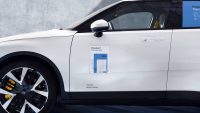The holding company of charity Motability turned a £748m profit before tax in 2023 into a whopping £565m LOSS last year.
Accounts filed under Motability Operations PLC for the year ended September 30, 2024, show that while revenue soared pre-tax profits collapsed.
The operation – which is owned by Barclays, HSBC, Lloyds Bank, and NatWest Group – saw total revenue jump by 24.4% from £5.5bn in 2023 to £6.9bn.
This was thanks to a 14.7% boost in customer numbers, a 6.7% uplift in mobility allowances from April 2024, and 28% increase in net proceeds from the sale of 277,000 vehicles (2023: 200,000) which generated £4bn (2023: £3.1bn).
Average gross sale for car disposals also rose – £15,000 compared to 2019’s £10,500.
The documents show that Motability Operations has a target of 1.5% post-tax return on assets in its lease pricing.
Total vehicles on fleet came to 815,000, and the operation welcomed a record 170,000 new customers to its books and 220,000 renewing customers.
It was also a record year for new application volumes (213,000) and there was ‘significant’ uplift in applications to 17% for EVs, which now represent 9% of Motability’s fleet.
Despite the gains, a £748m pre-tax profit in 2023 U-turned to a whopping £565m loss.
The accounts outlined in detail the reason for the collapse in profit: increase in investments to support customers in both EV and New Vehicle Payments, residual value effects, charitable donations, and inflationary impacts on its fleet’s underlying costs.
New Vehicle Payment (NVP) jumped from £78.9m in 2023 to £152.6m in 2024, which sees a £750 one-off payment to new and renewing customers, payable on the on the delivery of the new car.
In 2023, Motability extended this payment to customers who placed an order during 2024, and the accounts showed that £541m has so far been paid out, with a further £56.1m committed across its order bank. The operation pointed out that while eligibility for the payments will end in 2024, they will continue to be recognised in income statements over the extra three years, totalling £304.3m.
EV investment totalled £57.7m, up from £19.6m in 2023. Some £265.5m has been set aside to subsidise prices for 98,000 customers, including 66,000 free home wallbox chargers.
For residual value effects, Motability Operations saw gains from end-of-lease disposals during 2023. There was a £8.9m gain in the year to September 2024 (2023: £420.4m) across a turnover of £2.8bn and 202,000 vehicles sold – losses in the first three months of the year were offset by ‘modest’ gains in used car values in later months.
No donations was given to the Motability Foundation in 2024 (2023: £250m), while the operation also experienced ‘significant inflationary impact’ from hiked insurance costs.
With this taken into account, underlying result before tax came to a £130.3m loss, compared to a £45.1m profit in 2023.
CEO Andrew Miller received a salary of £460,000 (2023: £439,000) while CFO Matthew Hamilton-Jones was paid £374,000 (2023: £358,000). Bonuses came to £198,000 and £114,000, respectively.
In his outlook for the year ahead, Hamilton-Jones said: ‘Whilst we remain confident that our proposition continues to represent excellent value for money (47% cheaper than the comparable market benchmark), with the NVP and EV investment programmes coming to an end, it is unavoidable that current inflationary impacts are now flowing through into customer prices, and this will present challenges for affordability.
‘We continue to work hard to ensure that we drive the best possible value through the commercial arranges with our Mutability Scheme partners.’
He added that as its fleet transitions towards EV in the future, there will be ‘volatility’ in residual values, and due to the operation’s target of 1.5% return on assets, a positive underlying result is expected in future years.



































